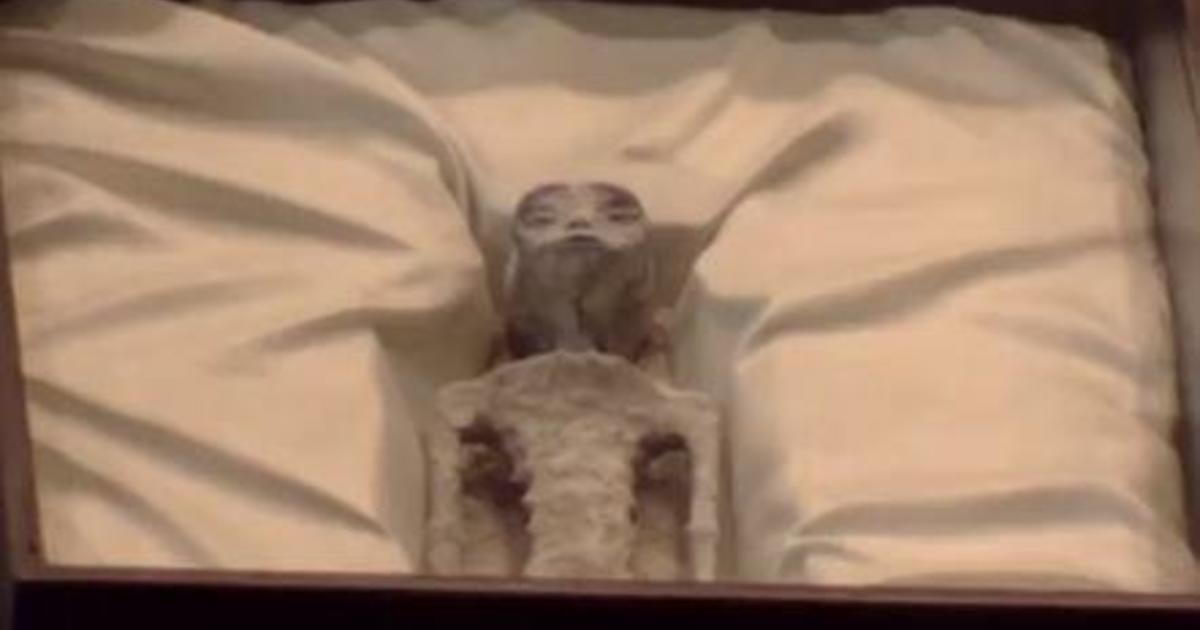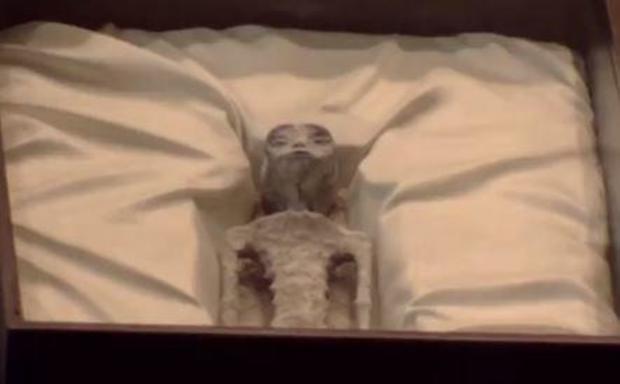A journalist and researcher on unidentified anomalous phenomena (UAP), or UFOs as they’re better known, presented the remains of purported “non-human” beings to lawmakers in Mexico on Tuesday during the country’s first public congressional hearing on the topic.
Jamie Maussan brought two boxes containing what he said were the small, stuffed bodies of extraterrestrials recovered in Peru in 2017. He said carbon-14 dating carried out by the National Autonomous University of Mexico had determined the remains were 700 and 1,800 years old. Each of the figures has only three fingers on each hand and elongated heads, resembling, at least superficially, the Hollywood-born character ET.
Congress of Mexico, Chamber of Deputies
“This is the first time it (extraterrestrial life) is presented in such a form and I think there is a clear demonstration that we are dealing with non-human specimens that are not related to any other species in our world,” Maussan told the lawmakers, urging them to consider the topic, which he said should not be viewed as “a political topic — it’s a topic for humanity.”
He said DNA evidence could prove the specimens were not of this planet, but it wasn’t clear if any such tests had been carried out.
At least one previous claim by Maussan about purported “non-human” remains discovered in Peru has been debunked, though the specimens he presented Tuesday in Mexico City appeared different to the one he previously spoke about in 2015.
Congress of Mexico, Chamber of Deputies
The hearing was to debate language on UAP in the Aerial Space Protection Law, which, if approved, would turn Mexico into the first nation to formally acknowledge the presence of alien life ever existing on Earth, the Reuters news agency said, citing local media.
Maussan, who appears regularly in Mexico media to present his research and reporting on UFOs, was joined for the hearing in the Mexican Congress’ lower Chamber of Deputies by a former U.S. Navy pilot who recently made a similar case to U.S. politicians in Washington.
Ryan Graves, the executive director of the Americans for Safe Aerospace organization, told the Mexican politicians that he founded the group after “recognizing the need for action and answers.”
“We believe that UAP represent an urgent priority for both aerospace safety and scientific inquiry,” he said Tuesday. “Our focus is on improving public education of UAP, breaking stigma and working towards better transparency and disclosure.”
In July, Graves addressed members of the U.S. House of Representatives along with David Grusch, a former military intelligence officer-turned-whistleblower who accused the U.S. executive branch of keeping Congress and the American people in the dark about UAPs.
Grusch, who served for 14 years as an intelligence officer with the U.S. Air Force and National Geospatial Intelligence Agency, including as a representative on two Pentagon task forces investigating UAP, told the House Oversight Committee’s national security subcommittee in July that he’d learned of “a multi-decade UAP crash retrieval and reverse-engineering program” during his work examining classified U.S. programs.
The U.S. Department of Defense’s All-Domain Anomaly Resolution Office, which Congress established to investigate such incidents, had probed roughly 800 reports of UAP as of May 2023. While military officials have said most cases have innocuous origins, many others remain unexplained.
Lawmakers have also suggested the U.S. military knows more about the objects than it has disclosed to Congress.
About a month after the hearing in Washington, the Pentagon announced that the All-Domain Anomaly Resolution Office had launched a new website to provide the public with declassified information about UAP.
Graves was an F-18 pilot based in Virginia Beach in 2014 when he says his squadron first started detecting unknown objects. He described them as “dark grey or black cubes… inside of a clear sphere, where the apex or tips of the cubes were touching the inside of that sphere.”
He said a fellow pilot had told him about an incident about 10 miles off the coast in which an object between 5 and 15 feet in diameter flew between two F-18s, coming within 50 feet of the aircraft. He said there was no acknowledgement of the incident by the U.S. Navy or way to report the encounter at the time.
UAP encounters, Graves told the U.S. lawmakers in July, were “not rare or isolated.”
“We are left with thoughts, with concerns, and with the plan to continue talking about this,” concluded Mexican lawmaker Sergio Gutierrez at Tuesday’s hearing, according to Reuters. “Let’s hope that this is the first of several events and that there will be discussions within the Legislative on the need or not to make proposals to modify the laws.”













